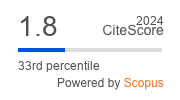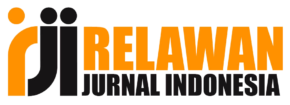Pemodelan Hubungan Kausal dari Faktor-Faktor Penentu Cancer Related Fatigue Menggunakan Algoritma S3C-Latent
Abstract
Cancer patients experience cancer-related fatigue (CRF) that are subjective and persistent. CRF can have a negative impact on psychosocial, spiritual, and self-perceived burden. To understand more deeply about CRF, we need to answer one fundamental question: how are the causal mechanisms (cause-effect) of the factors related to CRF. The studies related so far are still limited to correlation analysis between factors and have not focused on the mechanism of a causal relationship. The purpose of this study is to model the causal relationship between CRF and psychosocial, spiritual, and self-perceived burden, using a causal method called the Stable Specification Search for Cross-Sectional Data With Latent Variables (S3C-Latent). The results of this study are in the form of causal modeling between factors where self-burden has a causal relationship with CRF, spiritual need factors (religion) also have a causal relationship with CRF. Meanwhile, the social support factor (friends) with spiritual needs (religion) does not represent a causal relationship, but there is a strong association relationship. Meanwhile, the social support factor (friends) with CRF did not have a causal relationship or an association relationship between the two variables.
Downloads
References
R. L. Siegel, K. D. Miller, and A. Jemal, “Cancer statistics, 2019,” CA. Cancer J. Clin., vol. 69, no. 1, pp. 7–34, 2019, doi: 10.3322/caac.21551.
P. J. Campbell et al., “Pan-cancer analysis of whole genomes,” Nature, vol. 578, no. 7793, pp. 82–93, 2020, doi: 10.1038/s41586-020-1969-6.
Kementerian Kesehatan RI Badan Penelitian dan Pengembangan, “Hasil Utama Riset Kesehatan Dasar,” Kementrian Kesehat. Republik Indones., pp. 1–100, 2018, doi: 1 Desember 2013.
S. J. Stapleton, J. Holden, J. Epstein, and D. J. Wilkie, “Symptom clusters in patients with cancer in the hospice/palliative care setting,” Support. Care Cancer, vol. 24, no. 9, pp. 3863–3871, 2016, doi: 10.1007/s00520-016-3210-6.
J. E. Bower, “Behavioral symptoms in patients with breast cancer and survivors,” J. Clin. Oncol., vol. 26, no. 5, pp. 768–777, 2008, doi: 10.1200/JCO.2007.14.3248.
L. Fiorentino, M. Rissling, L. Liu, and S. Ancoli-Israel, “The symptom cluster of sleep, fatigue and depressive symptoms in breast cancer patients: Severity of the problem and treatment options,” Drug Discov. Today Dis. Model., vol. 8, no. 4, pp. 167–173, 2011, doi: 10.1016/j.ddmod.2011.05.001.
N. K. Horick, A. Muzikansky, H. L. Gutierrez, K. L. Boyd, and D. M. Finkelstein, “Physical symptoms in long-term survivors of rare cancer,” J. Cancer Surviv., vol. 12, no. 6, pp. 835–842, 2018, doi: 10.1007/s11764-018-0721-9.
J. E. Bower, “Prevalence and causes of fatigue after cancer treatment: The next generation of research,” J. Clin. Oncol., vol. 23, no. 33, pp. 8280–8282, 2005, doi: 10.1200/JCO.2005.08.008.
X. S. Wang and J. F. Woodruff, “Cancer-related and treatment-related fatigue,” Gynecol. Oncol., vol. 136, no. 3, pp. 446–452, 2015, doi: 10.1016/j.ygyno.2014.10.013.
J. E. Bower, J. Wiley, L. Petersen, M. Irwin, S. W. Cole, and P. A. Ganz, “Fatigue after breast cancer treatment: Biobehavioral predictors of fatigue trajectories,” Heal. Psychol, 2018, doi: 10.1037/hea0000652.
J. hye Park, H. jun Jeon, H. joong Kang, I. S. Jeong, C. kwan Cho, and H. seung Yoo, “Cancer-related Fatigue in Patients with Advanced Cancer Treated with Autonomic Nerve Pharmacopuncture,” JAMS J. Acupunct. Meridian Stud., vol. 8, no. 3, pp. 142–146, 2015, doi: 10.1016/j.jams.2015.04.003.
G. A. Curt et al., “Impact of Cancer‐Related Fatigue on the Lives of Patients: New Findings From the Fatigue Coalition,” Oncologist, vol. 5, no. 5, pp. 353–360, 2000, doi: 10.1634/theoncologist.5-5-353.
H. Ghavami and N. Akyolcu, “The Impact of Lifestyle Interventions in Breast Cancer Women after Completion of Primary Therapy: A Randomized Study,” J. Breast Heal., vol. 13, no. 2, pp. 94–99, 2017, doi: 10.5152/tjbh.2017.3342.
M. E. Schmidt, J. Wiskemann, A. Schneeweiss, K. Potthoff, C. M. Ulrich, and K. Steindorf, “Determinants of physical, affective, and cognitive fatigue during breast cancer therapy and 12 months follow-up,” Int. J. Cancer, vol. 142, no. 6, pp. 1148–1157, 2018, doi: 10.1002/ijc.31138.
C. S. Utami, C. Effendy, and S. Setiyarini, “Hubungan Antara Self Perceuved Burden Dengan Cancer Related Fatigue Pada Pasien Kanker Payudara,” Skripsi, 2017.
L. A. Simmons, “Self-perceived burden in cancer patients: Validation of the Self-perceived Burden Scale,” Cancer Nurs., vol. 30, no. 5, pp. 405–411, 2007, doi: 10.1097/01.NCC.0000290816.37442.af.
N. C. Y. Yeung, Q. Lu, and W. W. S. Mak, “Self-perceived burden mediates the relationship between self-stigma and quality of life among Chinese American breast cancer survivors,” Support. Care Cancer, vol. 27, no. 9, pp. 3337–3345, 2019, doi: 10.1007/s00520-018-4630-2.
C. R. Lofaso and D. A. Weigand, “Individual Characteristics and Self-Perceived Burden in Cancer Patients,” Curr. Psychol., vol. 33, no. 2, pp. 174–184, 2014, doi: 10.1007/s12144-014-9204-y.
I. P. A. Dharmawan, S. Setyarini, and C. Effendy, “Hubungan Dukungan Sosial Dengan Cancer Related Fatigue Pada Pasien Kanker Payudara,” Skripsi, 2017.
S. S. Utami and M. Mustikasari, “Aspek Psikososial Pada Penderita Kanker Payudara: Studi Pendahuluan,” J. Keperawatan Indones., vol. 20, no. 2, pp. 65–74, 2017, doi: 10.7454/jki.v20i2.503.
T. F. Prastiwi, “Kualitas Hidup Penderita Kanker,” Dev. Clin. Psychol., 2012.
A. F. Chou, S. L. Stewart, R. C. Wild, and J. R. Bloom, “Social support and survival in young women with breast carcinoma,” Psychooncology., vol. 21, no. 2, pp. 125–133, 2012, doi: 10.1002/pon.1863.
K. Hatamipour, M. Rassouli, F. Yaghmaie, K. Zendedel, and H. A. Majd, “Spiritual needs of cancer patients: A qualitative study,” Indian J. Palliat. Care, vol. 21, no. 1, pp. 61–67, 2015, doi: 10.4103/0973-1075.150190.
F. Hasnani, “Spiritualitas dan Kualitas Hidup Penderita Kanker Serviks,” J. Poltekkes, pp. 123–132, 2012.
D. I. J. I. Ayu, E. Y. A. B. Sunaryo, and C. Effendy, “Hubungan Antara Cancer Related Fatigue Dengan Kebutuhan Spiritual Pada Pasien Kanker payudara,” Skripsi, 2017.
M. Sabado, S. P. Tanjasiri, S. Mata‘alii, and M. Hanneman, “Role of Spirituality in Coping with Breast Cancer: A Qualitative Study of Samoan Breast Cancer Survivors and their Supporters,” Californian J. Health Promot., vol. 8, no. SI, pp. 11–22, 2010, doi: 10.32398/cjhp.v8iSI.2039.
L. T. Penberthy, D. M. Winn, and S. M. Scott, “Cancer Surveillance Informatics,” Oncol. Informatics, pp. 277–285, 2016, doi: 10.1016/b978-0-12-802115-6.00014-8.
W. Blumenthal et al., “Using informatics to improve cancer surveillance,” J. Am. Med. Inform. Assoc., vol. 27, no. 9, pp. 1488–1495, 2020, doi: 10.1093/jamia/ocaa149.
R. Rahmadi and U. I. Indonesia, “Stable Specification Search in Structural Equation Models with Latent Variables,” vol. 1, no. 1, pp. 1–23, 2019.
N. Meinshausen and P. Bühlmann, “Stability selection,” J. R. Stat. Soc. Ser. B Stat. Methodol., vol. 72, no. 4, pp. 417–473, 2010, doi: 10.1111/j.1467-9868.2010.00740.x.
K. Deb, A. Pratap, S. Agarwal, and T. Meyarivan, “A fast and elitist multiobjective genetic algorithm: NSGA-II,” IEEE Trans. Evol. Comput., vol. 6, no. 2, pp. 182–197, 2002, doi: 10.1109/4235.996017.
D. Cella, J. S. Lai, C. H. Chang, A. Peterman, and M. Slavin, “Fatigue in cancer patients compared with fatigue in the general United States population,” Cancer, vol. 94, no. 2, pp. 528–538, 2002, doi: 10.1002/cncr.10245.
R. C. Stewart, E. Umar, B. Tomenson, and F. Creed, “Validation of the multi-dimensional scale of perceived social support (MSPSS) and the relationship between social support, intimate partner violence and antenatal depression in Malawi,” BMC Psychiatry, vol. 14, no. 1, pp. 1–11, 2014, doi: 10.1186/1471-244X-14-180.
A. Büssing, H.-J. Balzat, and P. Heusser, “Spiritual Needs Of Patients With Chronic Pain Diseases And Cancer - Validation Of The Spiritual Needs Questionnaire,” Eur. J. Med. Res., 2010.
N. B. Erichsen and A. Büssing, “Spiritual needs of elderly living in residential/nursing homes,” Evidence-based Complement. Altern. Med., vol. 2013, 2013, doi: 10.1155/2013/913247.
A. Wardiyah, “Identification of Factors Affecting The Breast Cancer Patients Optimism Of Healing,” Ejournal.Umm.Ac.Id, vol. 5, pp. 121–127, 2012.
L. A. Kirana, “Dukungan Sosial Dan Resiliensi Pada Pasien Kanker Payudara (Studi Kasus Pada Pasien Kanker Payudara Yang Sedang Menjalani Kemoterapi),” Psikoborneo, vol. 4, no. 4, pp. 829–837, 2016.
D. Witdiawati, “Dukungan Sosial Dalam Adaptasi Kehidupan Klien Kanker Payudara di Kabupaten Garut,” vol. 1, no. 1, pp. 76–82, 2018.
A. M. A. L. Witjaksono and V. V. R. Maulina, “Gambaran Perceived Social Support Pada Penderita Kanker Stadium Lanjut yang Menjalani Perawatan Paliatif,” J. Psikogenes., vol. 4, no. 1, p. 12, 2018, doi: 10.24854/jps.v4i1.514.
X. Jia, X. Liu, L. Ying, and C. Lin, “Longitudinal relationships between social support and posttraumatic growth among adolescent survivors of the wenchuan earthquake,” Front. Psychol., vol. 8, no. JUL, pp. 1–7, 2017, doi: 10.3389/fpsyg.2017.01275.
P. Suwignjo et al., “Hubungan Dukungan Sosial Dengan Kualitas Hidup Pasien Kanker : Systematic Review,” J. Keperawatan, vol. 7, no. 2, pp. 142–152, 2019.
A. Nuraeni, I. Nurhidayah, N. Hidayati, C. Windani Mambang Sari, and R. Mirwanti, “Kebutuhan Spiritual pada Pasien Kanker,” J. Keperawatan Padjadjaran, vol. v3, no. n2, pp. 57–66, 2015, doi: 10.24198/jkp.v3n2.1.
alfara aughlesia Nosantika, “Koping Religius dan Ketenangan Hati Pada Pasien Kanker,” Univ. Islam Indones., 2019.
R. Rahmadi, “Finding stable causal structures from clinical data,” Radboud Repository, 2019.
R. Maskey, J. Fei, and H. O. Nguyen, “Use of exploratory factor analysis in maritime research,” Asian J. Shipp. Logist., vol. 34, no. 2, pp. 91–111, 2018, doi: 10.1016/j.ajsl.2018.06.006.
J. H. Kim, “Statistical Results,” Korean J. Anesthesiol., vol. 72, no. 6, pp. 558–569, 2019.
J. I. Daoud, “Multicollinearity and Regression Analysis,” J. Phys. Conf. Ser., vol. 949, no. 1, 2018, doi: 10.1088/1742-6596/949/1/012009.
R. Rahmadi, P. Groot, and T. Heskes, “Stable specification search in structural equation models with latent variables,” ACM Trans. Intell. Syst. Technol., vol. 10, no. 5, 2019, doi: 10.1145/3341557.
R. Rahmadi, P. Groot, and T. Heskes, “The stablespec package for causal discovery on cross-sectional and longitudinal data in R,” Neurocomputing, vol. 275, pp. 2440–2443, 2018, doi: 10.1016/j.neucom.2017.10.064.
Y. D. W. Werdani, “Effect of Cancer Related Fatigue tTo the Level of Independence of Cancer Patients and Caregiver Stress Level,” Folia Medica Indones., vol. 54, no. 2, p. 108, 2018, doi: 10.20473/fmi.v54i2.8859.
M. Oeki and M. Takase, “Coping Strategies for Self-perceived Burden among Advanced Cancer Patients,” Cancer Nurs., vol. 43, no. 6, pp. E349–E355, 2020, doi: 10.1097/NCC.0000000000000723.
D. Martina, R. Putranto, A. Rachman, and H. Shatri, “Unmet spiritual needs and its correlation with fatigue in early and advanced stage cancer patients in Indonesia.,” Am. Soc. Clin. Oncol., 2017.
M. Baetz and R. Bowen, “Chronic pain and fatigue: Associations with religion and spirituality,” Pain Res. Manag., vol. 13, no. 5, pp. 383–388, 2008, doi: 10.1155/2008/263751.
A. Berger, “Treating Fatigue in Cancer Patients,” 2003.
M. Saad, R. de Medeiros, and A. Mosini, “Are We Ready for a True Biopsychosocial–Spiritual Model? The Many Meanings of ‘Spiritual,’” Medicines, vol. 4, no. 4, p. 79, 2017, doi: 10.3390/medicines4040079.
C. Y. Ochoa, R. Haardörfer, C. Escoffery, K. Stein, and K. I. Alcaraz, “Examining the role of social support and spirituality on the general health perceptions of Hispanic cancer survivors,” Psychooncology., vol. 27, no. 9, pp. 2189–2197, 2018, doi: 10.1002/pon.4795.
Copyright (c) 2020 Jurnal RESTI (Rekayasa Sistem dan Teknologi Informasi)

This work is licensed under a Creative Commons Attribution 4.0 International License.
Copyright in each article belongs to the author
- The author acknowledges that the RESTI Journal (System Engineering and Information Technology) is the first publisher to publish with a license Creative Commons Attribution 4.0 International License.
- Authors can enter writing separately, arrange the non-exclusive distribution of manuscripts that have been published in this journal into other versions (eg sent to the author's institutional repository, publication in a book, etc.), by acknowledging that the manuscript has been published for the first time in the RESTI (Rekayasa Sistem dan Teknologi Informasi) journal ;








